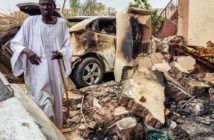A page has turned…
… and another is being written. Recently, the history of the Arab world has accelerated – the events of the year 2015 have achieved the demystification of the “Arab spring” and have confirmed the renewal of political Islam. It defies the avatars of theological schools born from the vicissitudes of history and of political and social compromise, overtaking them to restore the unity of the Ummah, in respect of the only truthful Islam, that of the Prophet and his followers; an international phenomenon that assails the planet, a struggle against relativism that has lead the believers astray, an irreductible struggle that does not cease to disconcert the West and the rest of the world.
The old regime has returned to Tunisia, crawling, but definitively. Bashar al-Assad remains screwed onto his throne in Damascus and becomes, little by little, the champion of the resistance against the Islamic State. Libya is nothing more than a rag of a state – its failure being undeniable.
Egypt has definitely sealed the fate of the revolution in a military dictatorship that sells itself to the highest bidder: some weaponry purchases from France in exchange for the recognition of the regime in Paris and the participation of the French President Hollande at the inauguration ceremony of the real fake second Suez Canal. An alliance with Moscow against the Islamic State and a de facto – but in fine admitted – rapprochement with Damascus. Relations with Washington have become acceptable again, after the USA hesitated all along the “Arab spring”, but now retains its privileges with the joint staff of the Egyptian army.
Yemen is now very far away from the democratic illusions that had been borrowed to this country, victim of a fierce war, that is not entirely its own and opposes Iran and Saudi Arabia…
Saudi Arabia, the rascal who supported the Islamists with all its power during the “Arab spring” and since quite a while before that – now finds itself in a very uncomfortable position: threatened by the Islamic State that it had been financing since the very beginning (along with its Qatari and Kuwaiti allies), the regional Sunni power is also overwhelmed in Iraq and in Yemen by a growing Shia influence from Iran… The choice is Cornelian, but Riyadh seems to have finally decided between the two dangers: at some point the decision has been taken to abandon Jihadism, as well as the Muslim Brotherhood in Cairo (and to give back the control of the country to the Egyptian army, so as to efficiently focus on the Islamic State). But since the passing away of King Abdallah, in January 2015, his successor, Salman, has recomposed the government in depth, as well as the influences inside the palace, so as to return without reserve towards the politics of the past and to again, without caution, promote armed Jihad, hoping to thereby counter the ambitions of Tehran on the Arab peninsula.
Turkey still today supports the Islamic State too, within the framework of a pro-Sunni, neo-Ottoman and entirely crazed policy. This Turkish policy is not only ambiguous towards its allies (NATO and Moscow), but has also become absurd, given that Ankara has obviously lost the game – although it had hoped to become the new pivot capital of the Sunni world and to thereby recover the grandeur of the past days of the Sultans: the Muslim Brotherhood has failed everywhere and the Islamic State is not anymore a toy that can be manipulated at will. Erdogan’s politics resembles more and more the actions of a desperate and distraught man… What is he still expecting from his support of the Islamic State? Ankara secretly buys its petrol, sure, but then what? Allowing the shooting down of a Russian bomber… Then the Ottoman Minister of Foreign Affairs declares to be able to “Occupy Russia in less than seven days”; Moscow must be rolling on the floor laughing very hard.
At the same time, war follows its course in the Middle East.
The programmed disappearing of oriental Christianity follows its course mutely and irreparably.
Israel gains from the events in Syria, Iraq, Paris and elsewhere, the attention being not on its task of liquidating the Palestinian population, which –impertinently – still dares to claim loud and clear those territories that it has been chased away from more than sixty years ago.
War carries on and the Islamic State progresses, the great powers, overtaken by the events, not taking any action fit to put an end to the situation.
The international coalition only bombs the Islamic State, enriched even by Russia, unable to take the immense risk of deploying ground troops; the military actions are only modestly efficient and do not seem to worry the Jihadists.
It is not said often enough: the Sunni population of the regions already conquered by the Islamic State supports the Caliphate. Those Sunni populations were oppressed in Syria, by a regime tied to Shia Iran, and in Iraq, since the US invasion of 2003 by the Shia government of Nuri al-Malaki, who chased the Sunnis from Baghdad and nearly entirely from the army. In the Sunni regions of Iraq, the Iraqi army, mainly consisting of Shia soldiers, behaved over years like an occupation army, somewhat terrorising the population. The Islamic State hence appears like a liberator in the eyes of those mainly rural populations – whose way of life is only slightly different to that imposed by the Salafists.
In those regions, the Islamic State is “at home”. It will be very difficult to put the Jihadists away…
Nonetheless, if the Sunni populations of Syria and Iraq welcomed the islamist fighters, they are also tired of the state of permanent war, a side effect of the Jihadist presence. Also, should the opportunity present itself for those populations, to get rid of the Islamist supervision – and have the guarantee not to become a victim again of the government of Damascus or of the Shi’ite militias of Baghdad – then many local chiefs would cease to support the Caliphate.
The only solution goes through the redefinition of the Syrian and Iraqi borders, through the abolition of the Franco-British “Sykes-Picot” agreements, that had declared the end of the Ottoman Empire after the First World War.
It is also the only possible future: after the atrocities committed by the one and the other side in Syria during the civil war that rages in the country since nearly five years, a “national reconciliation” is simply unimaginable. Similarly, in Iraq: the Shi’ite militias take revenge on the population when they reconquer a Sunni village from the Islamic State; and the Sunni population digs mass graves for those Shi’ites that fall into their hands…
Probably the moment has come to definitely turn yet another page – that of colonialism; and to let the political, ethnic, cultural and religious realities of the Arab world recover their respective natural spaces and their legitimate expression.
But without really knowing what would come of it, if the great powers would ever agree to such a scenario, the irrational element would remain: the factor of uncertainty, which implies the spiritual and religious dimension that drives the renewed Islamic world.
No mistakes should be committed by limiting oneself to a too Cartesian analysis: the Islamic State is not only the result of a sum of geostrategic conflicts of interests… It draws its force from something else… As has perhaps already been understood by some chancelleries in Washington, in London, in Moscow…
It is not a Christian crusade that has begun, against an Islam of the past, lead by the “Christian” countries of the NATO – Turkey has excluded itself from it – and by holy Russia.
It is the crusade of capitalism and of Western materialism, against the Islam of origins, that refuses to lose the essence of what it has been and which it aims to raise now, universally.



